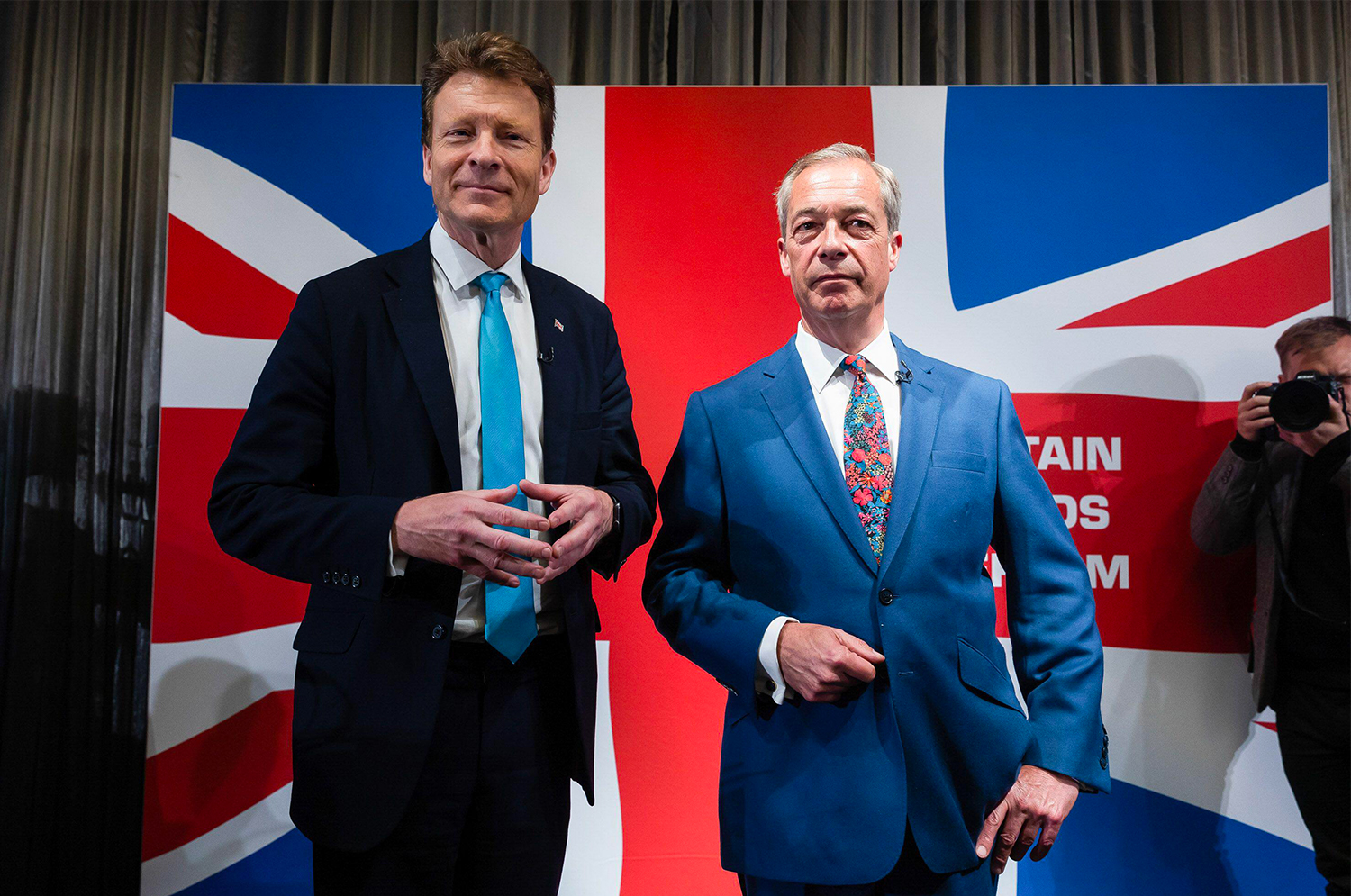Reform UK has received more than £2.3 million from oil and gas interests, highly polluting industries, and climate science deniers since December 2019, amounting to 92 percent of the party’s donations.
This week, Nigel Farage confirmed he would be returning as leader of Reform and standing in the general election, threatening to split the already fragile Conservative vote. His populist party, which campaigns to “scrap all of net zero”, claims to represent ordinary people against out of touch elites.
Yet Reform’s official register of donations reveals the party is bankrolled by rich businessmen who reject climate science or make money from polluting industries.
In the past 12 months, Reform has received £200,000 from First Corporate Consultants. The firm is owned by Terence Mordaunt, a director and former chair of the Global Warming Policy Foundation (GWPF), the UK’s leading climate science denial group.
The GWPF has in the past expressed the view that carbon dioxide has been mis-characterised as pollution, when in fact it is a “benefit to the planet”. Mordaunt himself told openDemocracy in 2019 that “no one has proved yet that CO2 is the culprit” of climate change.
The UN’s Intergovernmental Panel on Climate Change (IPCC), the world’s top climate science body, has stated that it is “unequivocal that human influence has warmed the atmosphere, ocean and land”. It has also stated that carbon dioxide “is responsible for most of global warming” since the late 19th century, which has increased the “severity and frequency of weather and climate extremes, like heat waves, heavy rains, and drought”.
Subscribe to our newsletter
Stay up to date with DeSmog news and alerts
Reform has also received more than £500,000 since the last election from Jeremy Hosking, whose investment firm Hosking Partners had more than $134 million (around £108 million) invested in the energy sector at the close of 2021, two thirds of which was in the oil industry, along with millions in coal and gas.
Hosking previously told DeSmog: “I do not have millions in fossil fuels; it is the clients of Hosking Partners who are the beneficiaries of these investments.”
Since December 2019, Reform has also received £465,000 from Christopher Harborne, owner of AML Global, an aviation fuel supplier with a distribution network that includes “main and regional oil companies”, according to its website. Harborne is also the CEO of Sheriff Global Group, which trades in private jets.
Aviation emissions accounted for eight percent of the UK’s annual greenhouse gas emissions before the pandemic, according to the government’s Climate Change Committee.
In response to DeSmog’s request for comment, Harborne posted a lengthy statement on the AML Global website. He said: “I am not a climate science denier and … I do not seek to influence any government through donations or lobbying regarding their policies on climate change or in favour of corporate interests.”
Harborne added that “there is overwhelming scientific evidence that human activity and in particular the use of hydrocarbons as an energy source is accelerating climate warming due to the greenhouse effect.”
Reform has also received more than £1.1 million in donations from Richard Tice, a property millionaire and the party’s leader until this week. Tice has now become the party’s chairman.
In addition (and not included in the overall figures for this analysis), Reform has received more than 50 loans collectively worth around £1.4 million from a company called Tisun Investments, which is owned by Tice, since the start of 2020.
Tice is one of the UK’s most prominent climate deniers, his presenting role on the right-wing broadcaster GB News to attack net zero policies and the science behind them. Tice has claimed that “there is no climate crisis” and expressed the view that “CO2 isn’t a poison. It’s plant food”.
DeSmog has also revealed that the governing Conservative Party has received £8.4 million since December 2019 from oil and gas interests, highly polluting industries, and individuals who have expressed or supported climate science denial.
“No political party should be taking any money from fossil fuel interests whatsoever,” Caroline Lucas, until recently the Green Party MP for Brighton Pavilion, told DeSmog.
Reform’s Climate Science Denial
Reform’s platform on climate change conforms to the views and business interests of its major donors.
The party’s manifesto falsely claims that “scientists disagree as to how much” humans have had an impact on global warming.
A number of climate consensus studies conducted between 2004 and 2015 found that between 90 percent and 100 percent of experts agree that humans are responsible for climate change. A study published in 2021, which reviewed over 3,000 scientific papers, found that over 99 percent of climate science literature says that global warming is caused by human activity.
Reform wants to develop new oil and gas fields in the North Sea, open onshore fracking sites across the country, end the windfall tax on oil and gas companies, and “restart opencast coal mines using the latest cleanest techniques”.
The party has campaigned for a referendum on the UK’s 2050 net zero emissions target, and supports scrapping the policy entirely.
Farage himself also has a long history of opposing green reforms and criticising established climate science.
Speaking on GB News in August 2021, Farage said that he was “very much an environmentalist” and that he couldn’t “abide things like plastics in our seas, pollution in our rivers.” However, on the issue of climate change, he added: “What annoys me though, is this complete obsession with carbon dioxide almost to the exclusion of everything else, the alarmism that comes with it, based on dodgy predictions and science.”
Reform’s only MP, Lee Anderson, who defected from the Conservative Party in March, has repeatedly attacked the government’s net zero policies, arguing in February 2024 that a net zero UK “wouldn’t make a blind bit of difference to the Earth’s atmosphere”.
Anderson is also a vocal backer of new oil, gas, and coal extraction in the UK. In 2022 he supported the government’s decision to approve a new coal mine in Cumbria – the UK’s first new coal mine for 30 years.
A Reform UK spokesman said: “Climate change is real, Reform UK believes we must adapt, rather than foolishly think you can stop it. We are proud to be the only party to understand that economic growth depends on cheap domestic energy and we are proud that we are the only party that are climate science realists, realising you can not stop the power of the sun, volcanoes or sea level oscillation.
“The deniers are those who continually gaslight the public into thinking you can stop these powerful natural forces. We must use the energy under our feet, rather than send our money and jobs abroad.”
Subscribe to our newsletter
Stay up to date with DeSmog news and alerts







